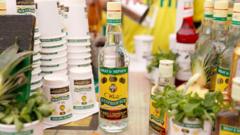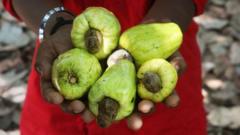The question of what makes a rum 'Jamaican' is central to an ongoing legal dispute involving several Caribbean distilleries. While some producers advocate for tighter regulations under a geographical indication that prohibits aging rum outside Jamaica, others argue that this could threaten their business models.
Legal Battle Erupts Over What Constitutes Authentic Jamaican Rum

Legal Battle Erupts Over What Constitutes Authentic Jamaican Rum
A dispute over the definition and authenticity of "Jamaica rum" is unfolding, sparking debates among local producers and raising concerns about global branding.
Rum, a cornerstone of Jamaica's cultural and economic identity, is now at the center of a legal tussle regarding its identification as "Jamaica rum." As producers on the island push for stringent guidelines to protect their product, the issue raises questions about what defines authentic Jamaican rum.
Last year, amendments were made to the geographical indication (GI) for Jamaica rum, established in 2016, restricting the aging process to within the island's borders. This change, prompted by the Spirits Pool Association (SPA)—which represents six distilleries including renowned names like Appleton and Hampden Estate—aims to fortify the product's status in key markets like the EU and US.
The SPA argues that a robust GI would not only differentiate Jamaican rum from competitors but would also enhance its recognition as a premium product rooted in Jamaican soil. However, this approach has ignited controversy, particularly with National Rums of Jamaica (NRJ), a major producer overseeing brands like Long Pond, which states that such regulations could jeopardize its business model reliant on exporting and aging rum abroad.
NRJ contests the ruling, asserting that rum produced on Jamaica but aged overseas still retains its Jamaican identity, citing a long history of such practices. A hearing to discuss NRJ's appeal is scheduled for April 28.
The debate touches not just on legal definitions but also the economic implications of rum production on the island. Proponents of strict GI definitions like Christopher Gentles, SPA's general manager, stress the importance of aging rum within the island to maintain its authenticity and ties to local culture, while also highlighting the economic advantages of keeping the entire production process in Jamaica.
Geographical indications serve to enhance product uniqueness, allowing for premium pricing and safeguarding local heritage. As seen in various regions worldwide, from Scotch whisky to Parmesan cheese, GIs can bolster local economies and pride in traditional crafts.
In a parallel situation, Barbados is also facing challenges regarding its rum GI, with discussions stalled due to objections from similar entities. This reflects a broader struggle among Caribbean nations to preserve their rum heritage amid global market pressures.
The SPA aims for Jamaica rum to achieve the EU's Protected Geographical Indication status, pending the resolution of the current dispute. Gentle expresses hope for a compromise that balances the interests of all stakeholders, as rumors persist that resolution could restore pride in Jamaica's storied rum legacy. Reports from local media echo this sentiment, advocating for the preservation of the Jamaican brand against outside influences that might dilute its authenticity.





















